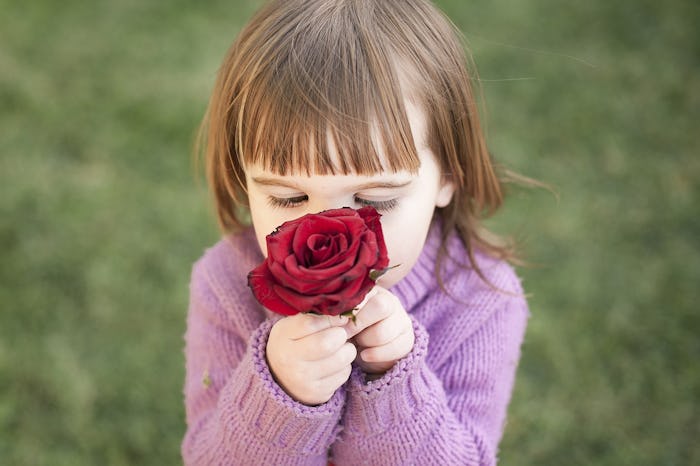More than anything, parents want their children to be healthy and happy. The toddler years can be a challenge, as little ones often go through a roller coaster of emotions during this time. But there are some toddlers that seem to be intrinsically happy. Is this happiness a product of nature or nurture? Maybe it's both, but there are a few things every happy toddler does.
According to the Mayo Clinic, the "terrible twos" is a time when toddlers struggle between relying on their parents and wanting to be independent. They are going through major motor, intellectual, social, and emotional changes, and want to try things out on their own. How many times has your little one proclaimed, "No, I do it!" only to become frustrated and have a meltdown when they can't do alone whatever it is that they'd be attempting? It can be exasperating. But these shows of independence are a sign that your child is growing up.
As they get older, toddlers pick up skills both from watching their parents and through hands-on learning. These skills help give them confidence and a sense of independence which can, in turn, lead to happiness.
Here are some things that every happy toddler does.
1The Take Naps
Just because your toddler fights nap time, doesn't mean he's outgrown it. A study led by the University of Colorado Boulder found that toddlers who miss just one daily nap exhibit more anxiety, less joy and interest, and have a harder time problem-solving. Making naps a priority can lead to happier toddlers (and mamas).
2 2. They Eat Regularly
This is tricky, especially considering the toddler years are synonymous with the picky-eating years. But, making sure that your little one is offered meals and snacks at regular times throughout the day can keep them from throwing hunger tantrums (adults call this being hangry). Ask Dr. Sears recommended offering your picky eater a nibble tray with bite-sized portions of colorful and nutritious foods. Nibble trays can be set out for an hour or two, and little ones who can't manage to sit still for regular meal times can graze as they play.
3They Express Emotions
Kids have real emotions, and because of social etiquette they aren't always allowed to talk about how they feel. A toddler might be truly afraid of a stranger or a large pet, or maybe they honestly don't like the taste of grandma's meatloaf. As a parent, you sometimes dismiss or even discipline your children for completely normal bursts of emotions because you're afraid that they will be seen as impolite. Allow your children to cry when they're sad, laugh when they're happy, act shy when they are nervous. Getting their feelings out as toddlers can save them a lifetime of pent up emotions.
4They Feel Loved
You know that it is emotionally important for a child to feel loved. But did you know that love helps your toddler develop physiologically, as well? Author and psychologist David R. Hamilton wrote on his website that the growth of the brain's orbitofrontal cortex (behind the orbits of the eyes) is negatively affected in children born into environments lacking in love, emotional warmth, and responsiveness.
5They Participate In Free Play
Free play allows your children to develop their imagination and creativity. According to Pediatrics, free play contributes to a child's cognitive, physical, social, and emotional well-being. Toddlers who are allowed to participate in "child-driven play" navigate a world created to fit their own needs and this makes for a happy kid.
6They Make Choices
Imagine if everything you experienced was a decision made for you by someone else. Obviously, toddlers can't make crucial life decisions, but they can, and should be given some choices: "Do you want an apple or a banana?"; "Do you want to wear the blue shorts or the white shorts?"; "Do you want to listen to "How Far I'll Go" or "You're Welcome"?" These simple choices allow your child to feel as though they are contributing and making important decisions, which leads to self-confidence and happiness.
7They Make Mistakes
Happy kids know how to cope. One way they developing coping skills is by being allowed to make mistakes. Mistakes teach kids how to keep trying and problem solve.
